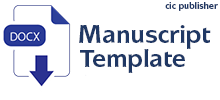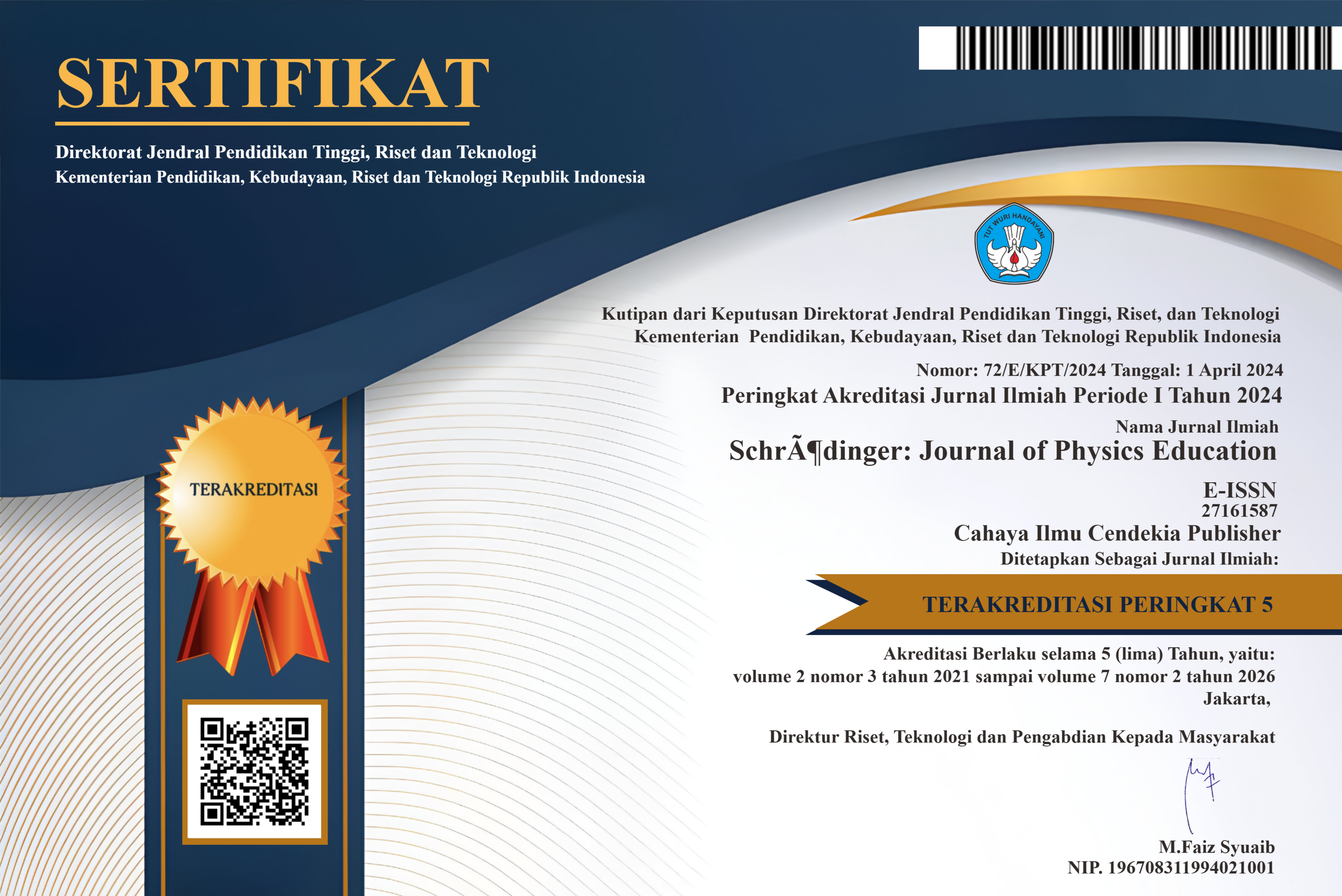Development of Computer-Based Learning Media on Collision Lesson Using the Context of Traditional Marbles Game
Abstract
Purpose of the study: This research aims to develop learning media using computer-based collision material in the context of the traditional game of marbles.
Methodology: This research is a Research and Development study using the ADDIE research design. The research was conducted at MA Al-Fatah Palembang using instruments in the form of interviews and questionnaires for data collection. Interviews were conducted with physics subject teachers at MA Al-Fatah Palembang. The questionnaire was given to media expert validators, material expert validators, teachers and students to see the validity and practicality of media use.
Main Findings: The result of this research is a learning media product using computer-based collision material in the context of the traditional game of marbles which meets the valid and practical criteria. The results of media expert validation that have been carried out show percentages of 91,7% with very valid categories. The material expert validation results show a percentage of 92.8% with a very valid category. The results of the limited trial showed that the percentage of assessments from physics subject teachers was 89,2% in the very practical category and students' responses to the use of learning media showed a percentage of 87.3% in the very practical category.
Novelty/Originality of this study: The main novelty of this study lies in utilizing a traditional game as a contextual and engaging framework to teach abstract physics concepts, such as collisions, in a more comprehensible way.
References
R. Amelia, U. Salamah, M. Abrar, D. Desnita, and U. Usmeld, "Improving student learning outcomes through physics learning media using macromedia flash," Journal of Education Technology, vol. 5, no. 3, pp. 491–500, 2021.
D. Pristiwanti, B. Badariah, S. Hidayat, and R. S. Dewi, "Pengertian pendidikan," Jurnal Pendidikan dan Konseling (JPDK), vol. 4, no. 6, pp. 7911–7915, 2022.
S. K. Bariyah, "Peran tripusat pendidikan dalam membentuk kepribadian anak," Jurnal Kependidikan, vol. 7, no. 2, pp. 228–239, 2019.
E. Herlina, N. P. Gatriyani, N. S. Galugu, V. Rizqi, N. Mayasari, Q. Nurlaila, and R. Saswati, Strategi Pembelajaran. Tohar Media, 2022.
Sairi, Andi Putra.2020. Media Pembelajaran Fisika dan Tutorial Animasi Flash. Jakarta: Kencana. 2020
M. W. Afgani, I. Rohmatullah, and H. Nizar, "Pengembangan media pembelajaran matematika berbasis Android pada materi lingkaran kelas VIII SMP," Supremum Journal of Mathematics Education, vol. 6, no. 2, pp. 191–192, 2022.
T. A. Silmi and A. Hamid, "Urgensi penggunaan media pembelajaran berbasis teknologi," Inspiratif Pendidikan, vol. 12, no. 1, pp. 69–77, 2023.
E. G. Swedin and D. L. Ferro, Computers: The Life Story of a Technology. Baltimore, MD, USA: JHU Press, 2007
A. Khumaidi and I. Sucahyo, "Pengembangan mobile pocket book fisika sebagai media pembelajaran berbasis android pada materi momentum dan impuls," Inovasi Pendidikan Fisika, vol. 7, no. 2, pp. 154–158, 2018.
W. A. Nisa, D. Damayanti, and A. Sulistyawati, "Pengembangan sistem pembelajaran berbasis komputer pada SMAN 2 Negeri Katon," Jurnal Teknologi dan Sistem Informasi, vol. 4, no. 1, pp. 49–53, 2023.
W. Annisa, "Speed reading techniques (Sprites) dengan media komputer berbasis kearifan lokal dalam pembelajaran membaca cepat," Deiksis: Jurnal Pendidikan Bahasa dan Sastra Indonesia, vol. 10, no. 1, pp. 43–53, 2023.
R. R. V. K. Dewi, A. Muslimat, K. D. Yuangga, D. Sunarsi, A. Khoiri, S. Suryadi, and U. Iswadi, "E-Learning as education media innovation in the industrial revolution and education 4.0 era," The Journal of Contemporary Issues in Business and Government, vol. 27, no. 1, pp. 2868–2880, 2021.
R. A. Cahdriyana and R. Richardo, "Karakteristik media pembelajaran berbasis komputer untuk siswa SMP," AlphaMath: Journal of Mathematics Education, vol. 2, no. 2, 2017.
N. P. Islam and A. M. Setiawan, "Urgensi pengembangan media pembelajaran berbasis multimedia interaktif Scratch sebagai upaya meningkatkan minat belajar siswa kelas VIII pada materi pesawat sederhana," Proceedings of Life and Applied Sciences, vol. 1, 2023.
P. C. Hamerski, D. McPadden, M. D. Caballero, and P. W. Irving, "Students’ perspectives on computational challenges in physics class," Physical Review Physics Education Research, vol. 18, no. 2, Art. no. 020109, 2022.
R. A. Sumarni, S. P. A. Alhidatuddiniyah, "Pengembangan media pembelajaran fisika berbasis Macromedia Flash Pro CS6 untuk kelas X SMAN 115 Jakarta," Jurnal Pendidikan Fisika UM Metro, vol. 6, no. 1, pp. 12–20, 2018.
S. N. M. Layyin and A. K. Haqiqi, "Pengembangan Media Pembelajaran Multimedia Interaktif Berbasis Adobe Flash Pada Materi Sudut Terintegrasi Nilai Keislaman," NCOINS: National Conference Of Islamic Natural Science, vol. 2, no. 1, pp. 95-109, Jan. 2023.
D. Zou, M. S. Y. Jong, X. Huang, G. Cheng, G. J. Hwang, and M. Y. C. Jiang, "A systematic review of SVVR in language education in terms of the ADDIE model," Interactive Learning Environments, pp. 1–26, 2023.
D. R. Martatiyana, H. Usman, and H. D. Lestari, "Application of the ADDIE model in designing digital teaching materials," Jurnal Pendidikan dan Pengajaran Guru Sekolah Dasar (JPPGuseda), vol. 6, no. 1, pp. 105–109, 2023.
Sugiyono, Metode Penelitian Pendidikan: Pendekatan Kuantitatif, Kualitatif, dan R&D, Bandung: Penerbit Alfabeta, 2017
Sugiyono, Metode Penelitian Pendidikan: Pendekatan Kuantitatif, Kualitatif, dan R&D, Bandung: Penerbit Alfabeta, 2017
Sugiyono, Metode Penelitian Pendidikan: Pendekatan Kuantitatif, Kualitatif, dan R&D, Bandung: Penerbit Alfabeta, 2017
B. N. Flagg, Formative Evaluation for Educational Technologies. New York, NY, USA: Routledge, 2013.
P. Sianipar, Pengembangan Instrumen Evaluasi Hasil Belajar Berbasis Genially pada Peserta Didik Kelas XI SMA, 2024.
M. A. Adeoye, K. A. S. I. Wirawan, M. S. S. Pradnyani, and N. I. Septiarini, "Revolutionizing education: Unleashing the power of the ADDIE model for effective teaching and learning," JPI (Jurnal Pendidikan Indonesia), vol. 13, no. 1, pp. 202–209, 2024, doi: 10.23887/jpiundiksha.v13i1.68624.
S. R. Andani, S. Y. Sari, A. Akmam, and P. D. Sundari, "The urgency of interactive learning media in improving students’ physics learning outcomes," Jurnal Ilmiah Profesi Pendidikan, vol. 8, no. 4, pp. 2415–2419, 2023.
N. A. Sari, "Pengembangan media pembelajaran animasi berbasis Adobe Flash Professional CS6 materi momentum dan impuls," Doctoral dissertation, IAIN Palangka Raya, 2021.
A. Khumaidi and I. Sucahyo, "Pengembangan mobile pocket book fisika sebagai media pembelajaran berbasis android pada materi momentum dan impuls," Inovasi Pendidikan Fisika, vol. 7, no. 2, pp. 154–158, 2018.
N. A. Sari, "Pengembangan media pembelajaran animasi berbasis Adobe Flash Professional CS6 materi momentum dan impuls," Doctoral dissertation, IAIN Palangka Raya, 2021.
F. Rahman, "Pengembangan multimedia interaktif berbasis Adobe Flash pada materi alat-alat optik," Doctoral dissertation, UIN Raden Intan Lampung, 2018.
S. N. M. Layyin and A. K. Haqiqi, "Pengembangan Media Pembelajaran Multimedia Interaktif Berbasis Adobe Flash Pada Materi Sudut Terintegrasi Nilai Keislaman," NCOINS: National Conference Of Islamic Natural Science, vol. 2, no. 1, pp. 95-109, Jan. 2023.
F. Utami, W. B. Sheftyawan, A. Y. Pratama, and B. Supriadi, "Penggunaan media pembelajaran aplikasi Wordwall untuk meningkatkan motivasi belajar peserta didik pada pembelajaran fisika di SMA," Jurnal Pembelajaran Fisika, vol. 12, no. 2, pp. 61–67, 2023.
Copyright (c) 2024 Imam Furqon, Muhammad Win Afgani, Jamiatul Khairunnisa Putri, Suhadi, Faizatul Mabruroh

This work is licensed under a Creative Commons Attribution 4.0 International License.
Authors who publish with this journal agree to the following terms:
- Authors retain copyright and acknowledge that the Schrödinger: Journal of Physics Education is the first publisher licensed under a Creative Commons Attribution 4.0 International License.
- Authors are able to enter into separate, additional contractual arrangements for the non-exclusive distribution of the journal's published version of the work (e.g., post it to an institutional repository or publish it in a book), with an acknowledgment of its initial publication in this journal.
- Authors are permitted and encouraged to post their work online (e.g., in institutional repositories or on their website) prior to and during the submission process, as it can lead to productive exchanges and earlier and greater citation of published work.







.png)
.png)








.png)
.png)
.png)







